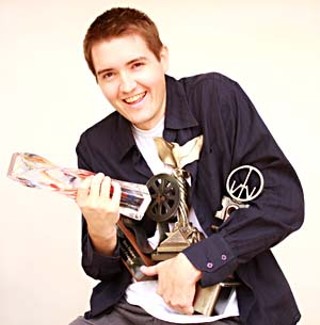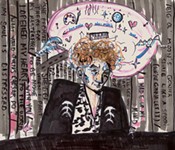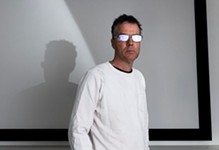Trial and Error, Rewarded
The days- and nights- and years-long journey to make 'August Evening'
By Shawn Badgley, Fri., Oct. 3, 2008

"Life can be disappointing even in the best of times," one character tells another in August Evening, and it's one of the many moments of understated resonance in Chris Eska's contemplative first feature. Though he and his producers joke about how poorly it might serve as a poster tagline, there's a bittersweet truth to it: The best of times are fleeting for all of us, of course, but at least they seem to come and go and come back again. For fiftysomething widower Jaime (Pedro Castaneda) and twentysomething widow Lupe (Veronica Loren), his daughter-in-law, those times are literally buried in the ground. As the unlikely duo staggers around Texas with no documentation and no work, their hope erodes along with the audience's. The hurt in this family drama (its leads heretofore nonactors, its language Spanish) is so relentless that you half expect the screen to go black in mourning – the ambient cicadas, San Antonio buses, and soundtrack from Jonathan Hughes and Windy & Carl to fade away; cinematographer Yasu Tanida's battered piers, roadside carnivals, and shotgun shacks to cave in on themselves; our protagonists and their underdogged senses of humor to vaporize – and you half wish it would. But by the closing credits, you're glad and grateful that it hasn't; the ultimate heartbreak happens when the experience has ended.
For Eska, a soft-spoken encyclopedia of mid-century world cinema, the experience of making August Evening – much of it in and around where he was raised in Gonzales County – was a trying time itself. One example that comes to mind is two people helping him, including production designer Elysia Van Deusen, were more than mildly electrocuted. On the first day. "A disaster," he says. "I wanted to quit. I wanted to go home." One problem: He was home, having moved back to Texas after finishing the short "Doki-Doki" in Japan and graduating from UCLA's Master of Fine Arts program. He wanted to do this. He had to. So, like his characters, the writer-director and his crew persevered. Following a brief hospital stint, Van Deusen was back for the 18-hour, 105-degree days. Eska rented a house to accommodate 20 people living co-op style and sleeping on air mattresses. With support from the locals (home-cooked meals and full borrowing rights at thrift stores), everyone got over the dust, chicken shit, and dwindling budget. If it wasn't exactly Herzog, it at least sounds like an interesting shoot. Upon the film's arrival on the festival circuit, things got more interesting: It was embraced across the board, capturing the Target Filmmaker Award for Best Narrative Feature in the wake of its Los Angeles Film Festival premiere and later the John Cassavetes Award at Film Independent's Spirit Awards, where Castaneda was nominated along with Don Cheadle, Frank Langella, Tony Leung, and Philip Seymour Hoffman for Best Male Lead. Loren won Best Actress at the Zimbabwe (!) International Film Festival. Leading up to its opening here, proclamations in support of August Evening are being issued statewide.
Heady times, maybe even the best of them, but the 32-year-old Eska – now living in Austin – knows things could get disappointing if people don't actually go see the film. (It opens in Austin on Oct. 10.) He doesn't feel pressure from his distributor, the legendary Moctesuma Esparza and Maya Pictures, or even particularly care about the money. He started with little more than a Texas Filmmakers' Production Fund grant and doesn't expect to get rich. He just believes that, on some level, August Evening will mean as much to viewers as it does to him. Which is why he and co-producer Jason Wehling sat down at Progress Coffee a couple of weeks ago to talk about it.
Chris Eska: I graduated from film school in 2003. "Doki-Doki" ... it had about as much success as a short film could have had, but that doesn't really mean anything in Hollywood. So I crashed on my then-girlfriend's futon for about a year and a half and just watched about three or four DVDs every single day. Broke them down, tried to figure out exactly why they worked, what I liked about the characters. I started to get really frustrated that I wasn't being productive, and it finally boiled over. I decided I was going to sell my car, move back to Texas, and get this feature going. People put a lot of pressure on their first film, their first feature, and a lot of people think that you should do something that's going to be a calling card, something slick that's going to impress everybody and make sure you can get your big 15- to 20-million-dollar film made. But I thought, you know, I may never get another chance, because it takes so many people, so much time, so much money to make a film, that I wanted to do something that was important to me even if it was just played in my parents' living room. And then, if it never made it, I don't know, at least I said what I had to say.
Austin Chronicle: What were you trying to say with August Evening?
CE: I was thinking about family issues. Generational senses of duty. I was thinking about things that had happened in my family, the emotions I go through, that I feel like we all go through, regardless of our backgrounds, that almost nobody ever shows in films. Mainstream, arthouse, even foreign. I felt like there wasn't anything out there right now similar to what I had in mind. I wanted to try and give an audience a place to go and experience those emotions. [Pauses] Jason actually quit his job at PBS to come and do this. That's how everything was done. Just so you know, Jason is sort of the silly one, and I'm the serious one. I like Ozu; he likes zombie films. But he keeps me from being too pretentious, and I keep him from going off the deep end. But he's the kind of guy I need on the set, because I'm so focused. He really held everything together.
Jason Wehling: I've known Chris for a long time. We were in undergraduate school together [at Rice].
CE: We met at Liberty Lunch. We kept going to the same shows all of the time.
JW: We realized, "I've seen you at school before," and then we started being in the same classes. There weren't many people; there weren't very many classes for film. I helped him on some of his shorts. I acted in one of them. And then, over the years, we both ended up in L.A. He went to graduate school at UCLA, and I went to D.C., to work for PBS in their programming department. We stayed connected, and one of his films came through, so I helped him find the right people, and they loved it. I didn't really have to do anything: I just pushed it in the right direction. And later on, he's like, "I want to do a feature," and I said, "Well, all right." [Laughs] From seeing his shorts develop, I saw him turn a corner at "Doki-Doki." I wanted to help. I was tired of sitting behind a desk; I wanted to come back [to Texas]. And I knew this was a project I could get behind.
CE: I wanted to come back to Austin. Jason wanted to come back to Austin. He was with his fiancée, now his wife. It was about sort of coming home and staying home. "I don't want to leave anymore." ... When I made the Japanese film, it was really about my isolation in the modern metropolis of Los Angeles. I wasn't connecting with people. That's what film's all about: How to connect with people. Then I came back to Austin, and within two months, I had more friends than I've ever had in my life. I had a huge network here, instantly, because it attracts a certain kind of people.
JW: So, then, I got back. He showed me a treatment. We wrote out a TFPF grant application that helped get our minds around exactly what was going to go on. Went into preproduction off of a 16-page treatment. Cast the film off of the treatment, did everything. Chris started working on the script, and we started finding locations, putting things together, gathering up the props. A lot of students from UT came down to Gonzales.
CE: I'd say half the crew was from UT.
AC: There are moments when the script, this time frame in the film, seems plucked from the strata of these characters' lives. You can totally imagine their pasts and their futures with very little exposition. Whenever I describe August Evening, its subject matter or whatever, to friends, they ask if it's a documentary.
CE: In terms of it feeling like a documentary, some of my heroes, they started out making documentary films and then moved into fiction. I thought it was important to have a handheld camera; not an annoying shaky cam for no reason but to make it feel as though the camera – and the audience, hopefully – is another family member sitting in the room.
August Evening opens in Austin on Oct. 10. See next week's Film Listings for more on the film.










